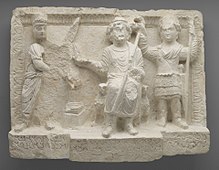
Back Гад Bulgarian גד (אל) HE Gad (dewa) ID Gad (divinità) Italian Gad (guddom) NB Гад (божество) Russian
This article needs additional citations for verification. (June 2015) |

| Deities of the ancient Near East |
|---|
| Religions of the ancient Near East |
Gad was the name of the pan-Semitic god of fortune, usually depicted as a male but sometimes as a female,[2] and is attested in ancient records of Aram and Arabia. Gad is also mentioned in the bible as a deity in the Book of Isaiah (Isaiah 65:11 – some translations simply call him (the god of) Fortune), as having been worshipped by a number of Hebrews during the Babylonian captivity.[3] Gad apparently differed from the god of destiny, who was known as Meni. The root verb in Gad means cut or divide, and from this comes the idea of fate being meted out.[4]
- ^ Kropp 2013, p. 225.
- ^ Niels Gutschow; Katharina Weiler (26 November 2014). Spirits in Transcultural Skies: Auspicious and Protective Spirits in Artefacts and Architecture Between East and West. Springer. pp. 14–. ISBN 978-3-319-11632-7.
- ^ Karel van der Toorn; Bob Becking; Pieter Willem van der Horst (1999). Dictionary of Deities and Demons in the Bible. Wm. B. Eerdmans Publishing. pp. 144–. ISBN 978-0-8028-2491-2.
- ^ van der Toorn, Becking & Willem van der Horst 1999, p. 339.
© MMXXIII Rich X Search. We shall prevail. All rights reserved. Rich X Search